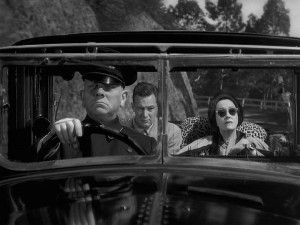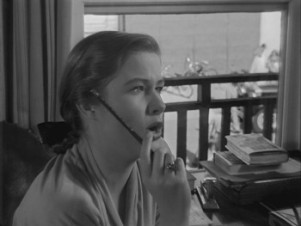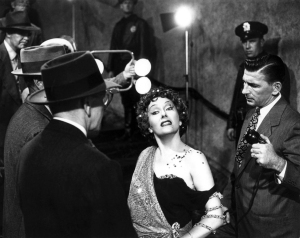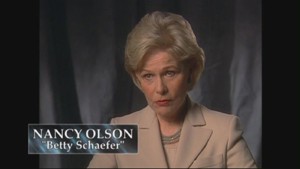
 |
|
|
|
After holding back on classic movies for Blu-ray for several years Paramount is slowly rolling out an in-house line of older favorites. The latest title offered is Billy Wilder's Sunset Blvd. a genuine classic that is simultaneously a crackling film noir, the best of the Hollywood-on-Hollywood dramas and an eerie grave marker for the lost age of silent movie glamour. Wilder and Charles Brackett's cynical script slammed Tinseltown as a slime pit of venal agents and producers, drawing the ire of some of the studio moguls that still ran the business. Actress Nancy Olson sums it up:
"There's the famous moment that Louis B. Mayer became absolutely incensed and went up to Billy and said, 'How can you do this to your own people, to our industry?" ... And Billy had a famous retort that I cannot, uh, quote, but he said something like oh, you know, go something to yourself." When Hollywood made a movie about itself, the result was often an overheated soap opera. Two excellent versions of A Star is Born certainly capture the glory of Movie Land, but the norm is best represented by the embarrassing The Oscar, a serious effort now regarded as a camp hoot. Billy Wilder's sublime Sunset Blvd. took years to be acknowledged as a masterpiece. The film is an acidic look at the way tinsel town trashes its own heritage. It is said that MGM's Louis B. Mayer was so furious he tried to interest other studio bigwigs in buying the negative and destroying it! Paramount's Blu-ray was slow coming, but it can boast a finely ("meticulously", says the package copy) restored image and sound. . 
Sunset Blvd. (that's the spelling on the film itself) is the story of Joe Gillis (William Holden), an unemployed screenwriter who ducks into the wrong Brentwood driveway and finds himself slipping twenty-five years into the past. The reclusive Norma Desmond (Gloria Swanson) is a former silent movie great that harbors delusions of making a comeback. Sheltered and indulged by her once-director, now-butler Max Von Mayerling (Erich von Stroheim), Norma lives in a wealthy fantasy world. Thinking that he'll pick up some easy money while dodging the auto repo men, Joe plays along with Norma's harebrained scheme to rewrite Salome as a starring vehicle. But he grossly underestimates his host's possessiveness. Joe falls in love with studio reader Betty Schaefer (Nancy Olson), but he cannot escape the jealous Norma. By 1950 Billy Wilder was experimenting with Noirs even darker than his breakthrough smash Double Indemnity. Sunset Blvd. is a mordant black comedy but also a stirring appreciation of Hollywood's glorious silent past. The basic idea came from Wilder's writing partner Charles Brackett, perhaps after reading James Agee's famous articles on silent comedians. It's hard to believe, but by the late 1940s silent movies were already considered obscure ancient history and were difficult to see outside of museum or art club screenings. Just a year or two before, the industry had all but ignored the funeral of screen pioneer D.W. Griffith. Barely in her fifties, Gloria Swanson was nothing like the delusional Norma Desmond, but she was well aware of the significance of Wilder's project. Some previous silent stars did indeed languish in denial, dreaming of career comebacks. Sunset Blvd. is as funny as any Hollywood satire, with little in the way of exaggeration. Agents and producers worry about their golf scores and take sadistic pleasure when freelance writer Joe Gillis begs for a job. In the classed society of the studios, a big man like Cecil B. DeMille is attended like a baron while young script readers and assistant directors entertain their ambitions with pizza and beer parties. After becoming entangled in the affairs of Norma Desmond, Joe is uncomfortable around his buddy Artie Green (Jack Webb, in his best film performance). Making matters worse, Joe is also dating Artie Green's girlfriend. Betty's enthusiasm should make Joe feel that he could succeed as a screenwriter, but he has already become far too dependent on the comforts of living with Norma. Few movies have communicated so well the self-loathing of a man who surrenders his ethics. Joe allows himself to become a passive gigolo with the self-deception that he's taking advantage of Norma. The movie has a sickly feeling, from the rot of Norma's crumbling mansion to the way Joe realizes that he's become too tainted to allow himself to "infect" the wholesome Betty Schaefer, with whom he might have formed the perfect screen writing team. 
The themes of despair and moral decay are definitely noir, but what Sunset Blvd. resembles most is a Gothic horror film. The "undead" Norma Desmond entices Joe Gillis away from the land of the living to share her waxwork fantasy of a bygone age. Like one of Dracula's minions, Joe is only the latest in a succession of victims that include a chimpanzee (!) and an ex-film director. Max the Butler fabricates phony fan letters, feeding Norma's fantasy the way one of Dracula's enablers might provide a fresh supply of blood. Norma controls and manipulates Joe with her forceful personality. Joe thinks he's a tough guy and can walk out whenever he likes, but he's fooling himself. In no time at all he's yielding to her will on every subject. Perhaps the only scene that rings false is the "waxworks" bridge game with the silent greats Anna Q. Nilson, H.B. Warner and Buster Keaton. Those lively personalities would surely make for a lively, fun party, but Wilder uses them to complete his movie star / living dead analogy. The silent stars' images remain youthful in classic films, while their living bodies age. The movies eventually turn actors into celluloid ghouls -- the fantasy outlives the reality. Wilder's casting certainly defined William Holden's screen image. He's boyishly charming but also a man fed up with the rat race. Holden was well aware going into the film that his career was in a dangerous slump, and Sunset Blvd. put him on the road to top stardom. Gloria Swanson is almost too young to play Norma and must distort her face to embody the grotesque aspects of the deluded diva. She's loathsome and pitiable at the same time. 
Swanson retired from films gracefully and invested her money with care. Erich von Stroheim is the personality with the fiery career. Director Stroheim's fights with studio heads resulted in his expulsion from Hollywood, and he retreated to acting, mostly in foreign films. His fanaticism for the movies was inseparable from his perverse outlook on life. Max Von Mayerling's accented voice and perpetual scowl make a bigger impact than the mad doctors of the Universal Horror movies. If you look closely, it's clear that Max is making a concerted effort to hold back his tears. The finale affords Stroheim the ability to direct again, ordering the newsreel cameras to record Norma's "big" close-up and descent into madness. The last image, a gauzy, glamorous nightmare, may be Billy Wilder's most impressive film conclusion. Charles Brackett initiated Sunset Blvd. but found many of Wilder's ideas harsh and distasteful. They split up afterwards, bringing to an end one of the movies' most successful writing collaborations. Wilder really let his bitter streak run wild on his next picture, the utterly misanthropic Noir Ace in the Hole. When that became an almost total failure (dubbed by the press, "Ass in the Wringer"), Wilder retreated to safer, more conventional comedies -- but with a cynical undertone. Paramount's Blu-ray of Sunset Blvd. improves on an already good 2008 release with a more delicate grayscale and the obvious visual benefits of HD. Although few scenes reach for expressive noir effects, Cameraman John F. Seitz has plenty of action occurring in half-lit interiors that now have a full dimension instead of blurring into a gray sameness. The full range of the audio track puts more punch into Franz Waxman's very noir music score. The gauzy finish benefits from the added resolution as well -- we're now more aware of the exact filtering used to dissolve Norma's mad close-up into a Vaseline haze. Some of the many extras came from two DVD releases back but most date to 2008 and a 'Centennial Edition' that commissioned a stack of featurettes from producer Laurent Bouzereau. All told there must be twelve of these interview-based shows that run between five minutes and half an hour. Paramount 'memory' man A.C. Lyles plays a big role, and director Nicholas Meyer, biographer Ed SIkov and actress Nancy Olson contribute interview input throughout. Critic Andew Sarris pops up when we need to be reminded of Blvd.'s classic status. Author Joseph Wambaugh is enlisted to assess the movie as a Film Noir, but instead looks at it from the viewpoint of a Hollywood policeman, adding his own list of favorite moments. The producer of a re-recording of the Waxman music score is present for what amounts to a promo piece. Waxman's career is separately covered in a very good older featurette with input from Elmer Bernstein, John Mauceri and Waxman's son John. Locations expert/author Borislav Stanic takes us on a trip down the full length of the real Sunset Blvd. Other featurettes discuss William Holden, the film as a classic (cue input from Glenn Close) and Gloria Swanson (with help from Brooke Anderson and Linda Harrison). Archived interviews with Gloria Swanson pop up as well. Older docus celebrate the Paramount lot and costume designer Edith Head. The problem with these featurettes is that by splintering the subject there is a lot of redundancy and a lack of cohesion. The same stills pop up again and again; the very good interviews have been spread out too thin. When allowed to "tell the story" of a movie in a longer form, producer Laurent Bouzereau's work is almost always excellent. In this pile of short shows we spend too much time waiting through introductions and epilogues, and no overall theme is allowed to build. And the repetition of film clips is stultifying -- some shots show up four and five times. I think that 60% of Sunset Blvd. could be reconstituted by reassembling clips from these featurettes. 1 Held over again from the first DVD release is Ed Sikov's academic but fact-filled commentary. An interactive Hollywood locations map is here along with a text extra that presents two script versions of the jettisoned "morgue" prologue, accompanied by outtakes found in the Paramount stock film library -- shots of the morgue truck pulling up to the dock, and a toe tag being wired to the foot of a corpse. 
The one new item in the stack is a brief deleted scene in at Artie Green's party, a sing-along moment with a tune called "The Paramount Don't Want Me Blues". Taking it out must have been a last minute adjustment. Although transferred in HD, the source material is a weak surviving copy, perhaps the actual clip pulled out of a preview print. The most audience-friendly presence in the abundant extras is the charming Nancy Olson, who discusses the industry's ambivalent attitude toward Billy's controversial movie. Although she suggests the charm of Billy Wilder the man does not appear in any file footage. None of the extras can really show what an aggressively funny, mischievous man he was. Wilder's unequalled wit is the highpoint of several biographies, and his skill with a dirty joke is legendary.
On a scale of Excellent, Good, Fair, and Poor,
Sunset Blvd. Blu-ray rates:
Footnote:
1. Laurent Bouzereau is almost the only disc docu producer that still receives name credit. The scarcity of long-form disc docus stems from a legal department determination that Home Video extras over half an hour long are not ephemeral promos but instead independent productions subject to Actor's Guild rules -- minimum payments, residuals, etc.. The ability to make memorable Value Added documentaries for discs faded as studios abandoned longer shows in favor of little chapters. Studios like long lists of extra goodies on their discs but also want them to cost next to nothing. Some insist that no credits be displayed, making these shows look even less substantial. That makes filmmakers feel as if their work is considered meaningless fluff and filler, to be bought by the yard. Careers are not built on fluff and filler.
Reviews on the Savant main site have additional credits information and are often updated and annotated with reader input and graphics. Also, don't forget the 2011 Savant Wish List. T'was Ever Thus.
Review Staff | About DVD Talk | Newsletter Subscribe | Join DVD Talk Forum |
| ||||||||||||||||||